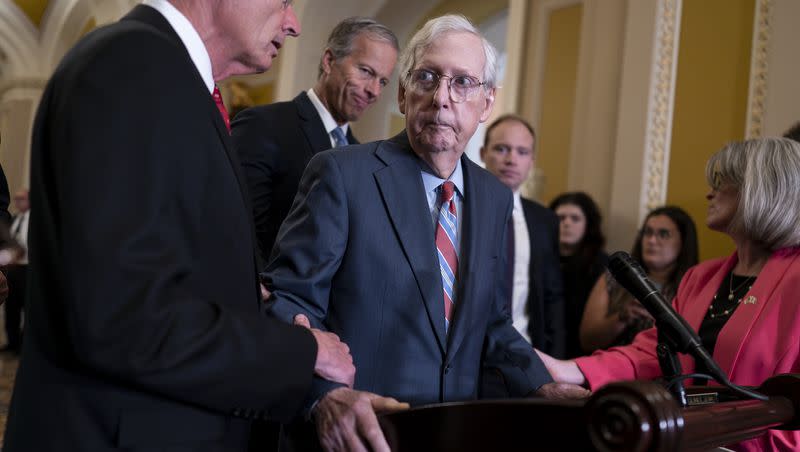Who could succeed McConnell as Senate Republican leader?

- Oops!Something went wrong.Please try again later.
- Oops!Something went wrong.Please try again later.
After Senate Minority Leader Mitch McConnell, 81, froze during a press conference earlier this week, it prompted questions about his health, and also about who might succeed him to lead Senate Republicans.
McConnell was also hospitalized earlier this year after a fall, but he plans to serve his full term, his office indicated.
“Leader McConnell appreciates the continued support of his colleagues, and plans to serve his full term in the job they overwhelmingly elected him to do,” a spokesperson told Politico in a statement Thursday.
McConnell is serving his seventh term in the U.S. Senate, which ends in 2027, making him the longest-serving Senate party leader in U.S. history. The Kentucky Republican was elected to the U.S. Senate in 1984, and he’s been the top Republican in the chamber since being elected minority leader in 2007.
Unlike his counterparts in leadership the U.S. House, McConnell has enjoyed widespread support from his conference since becoming party leader. He’s only been challenged for leader once, last year, and the senators seen as his most likely successors have said they’ll support him in the job as long as he wants it.
While House Republicans’ lengthy fight over speaker proves how contentious leadership elections can be, the transition from one leader to another can also be seamless. The late Sen. Harry Reid, D-Nev., named Sen. Chuck Schumer of New York as his successor when he announced he was retiring in 2015, and Schumer had the votes allowing Democrats to avoid a public fight.
Related
Here are some potential Senate Republicans who could find themselves heading the Republican conference next:
Sen. John Thune, R-S.D.
As minority whip, Thune is the No. 2 Senate Republican and seen as a top contender to be the next Republican leader. He won election to the Senate in 2004, beating then-Minority Leader Tom Daschle, D-S.D., to become the first challenger to beat a Senate party leader in 52 years. Thune told Fox News last year “the possibility perhaps of other leadership opportunities down the road” played a role in his decision to run for reelection.
Sen. John Cornyn, R-Texas
Cornyn was the Republican whip from 2013 to 2019, but stepped down because the position is term-limited. He remains interested in the top spot, though. In 2021 Cornyn told the Texas Tribune Festival he would support McConnell as long as he was in leadership, but “should he decide to step down and no longer serve as a leader, I’ve made it no secret that I would like to succeed him.”
Related
Sen. John Barrasso, R-Wyo.
Barrasso was a Wyoming state lawmaker before being appointed to the U.S. Senate in 2007. He’s been the Senate Republican Conference chair since 2019, the No. 3 Senate Republican, and could follow Thune as whip after he steps down due to term limits.
Sen. Rick Scott, R-Fla.
Scott was chair of the National Republican Senatorial Committee, or NRSC, until earlier this month, and running the Republican Party’s Senate campaign arm gave him a prominent post in the party. He challenged McConnell last year for floor leader for the first time but lost 37-10. Though Scott’s long shot bid came up short, it showed there’s at least some appetite for new leadership among Senate Republicans.

